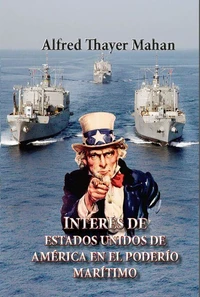The Influence of Sea Power upon the French Revolution and Empire
Par :Formats :
Disponible dans votre compte client Decitre ou Furet du Nord dès validation de votre commande. Le format ePub est :
- Compatible avec une lecture sur My Vivlio (smartphone, tablette, ordinateur)
- Compatible avec une lecture sur liseuses Vivlio
- Pour les liseuses autres que Vivlio, vous devez utiliser le logiciel Adobe Digital Edition. Non compatible avec la lecture sur les liseuses Kindle, Remarkable et Sony
 , qui est-ce ?
, qui est-ce ?Notre partenaire de plateforme de lecture numérique où vous retrouverez l'ensemble de vos ebooks gratuitement
Pour en savoir plus sur nos ebooks, consultez notre aide en ligne ici
- Nombre de pages682
- FormatePub
- ISBN859-65--4738654-4
- EAN8596547386544
- Date de parution13/11/2022
- Protection num.Digital Watermarking
- Taille2 Mo
- Infos supplémentairesepub
- ÉditeurDIGICAT
Résumé
Alfred Thayer Mahan's seminal work, "The Influence of Sea Power upon the French Revolution and Empire, " intricately explores the pivotal role of naval power in shaping the political landscape of the late 18th and early 19th centuries. Through rigorous historical analysis and persuasive argumentation, Mahan elucidates how maritime supremacy influenced the outcomes of the French Revolution and the Napoleonic Wars, setting the stage for modern warfare and international relations.
His scholarly approach is marked by a blend of meticulous research and an engaging narrative style, making complex geopolitical concepts accessible to a wide audience. Born in 1840, Mahan was a naval officer and historian whose career granted him valuable insights into military strategy and maritime affairs. His experiences during the height of the age of sail allowed him to appreciate the significance of naval dominance, which he believed was crucial for national prosperity and security.
This profound understanding motivated Mahan to investigate the historical precedents of sea power, ultimately leading to his influential theories that would affect naval strategy across the globe. I highly recommend this book to anyone interested in military history, naval strategy, and the interplay between sea power and statecraft. Mahan's arguments remain vital to comprehending contemporary geopolitical dynamics, as they underscore the enduring importance of naval capabilities in achieving national objectives.
His scholarly approach is marked by a blend of meticulous research and an engaging narrative style, making complex geopolitical concepts accessible to a wide audience. Born in 1840, Mahan was a naval officer and historian whose career granted him valuable insights into military strategy and maritime affairs. His experiences during the height of the age of sail allowed him to appreciate the significance of naval dominance, which he believed was crucial for national prosperity and security.
This profound understanding motivated Mahan to investigate the historical precedents of sea power, ultimately leading to his influential theories that would affect naval strategy across the globe. I highly recommend this book to anyone interested in military history, naval strategy, and the interplay between sea power and statecraft. Mahan's arguments remain vital to comprehending contemporary geopolitical dynamics, as they underscore the enduring importance of naval capabilities in achieving national objectives.
Alfred Thayer Mahan's seminal work, "The Influence of Sea Power upon the French Revolution and Empire, " intricately explores the pivotal role of naval power in shaping the political landscape of the late 18th and early 19th centuries. Through rigorous historical analysis and persuasive argumentation, Mahan elucidates how maritime supremacy influenced the outcomes of the French Revolution and the Napoleonic Wars, setting the stage for modern warfare and international relations.
His scholarly approach is marked by a blend of meticulous research and an engaging narrative style, making complex geopolitical concepts accessible to a wide audience. Born in 1840, Mahan was a naval officer and historian whose career granted him valuable insights into military strategy and maritime affairs. His experiences during the height of the age of sail allowed him to appreciate the significance of naval dominance, which he believed was crucial for national prosperity and security.
This profound understanding motivated Mahan to investigate the historical precedents of sea power, ultimately leading to his influential theories that would affect naval strategy across the globe. I highly recommend this book to anyone interested in military history, naval strategy, and the interplay between sea power and statecraft. Mahan's arguments remain vital to comprehending contemporary geopolitical dynamics, as they underscore the enduring importance of naval capabilities in achieving national objectives.
His scholarly approach is marked by a blend of meticulous research and an engaging narrative style, making complex geopolitical concepts accessible to a wide audience. Born in 1840, Mahan was a naval officer and historian whose career granted him valuable insights into military strategy and maritime affairs. His experiences during the height of the age of sail allowed him to appreciate the significance of naval dominance, which he believed was crucial for national prosperity and security.
This profound understanding motivated Mahan to investigate the historical precedents of sea power, ultimately leading to his influential theories that would affect naval strategy across the globe. I highly recommend this book to anyone interested in military history, naval strategy, and the interplay between sea power and statecraft. Mahan's arguments remain vital to comprehending contemporary geopolitical dynamics, as they underscore the enduring importance of naval capabilities in achieving national objectives.







